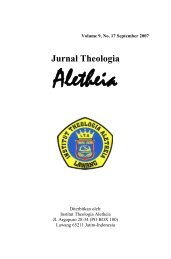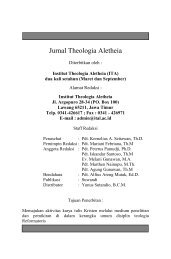download - Sekolah Tinggi Theologia Aletheia Lawang
download - Sekolah Tinggi Theologia Aletheia Lawang
download - Sekolah Tinggi Theologia Aletheia Lawang
Create successful ePaper yourself
Turn your PDF publications into a flip-book with our unique Google optimized e-Paper software.
75<br />
once again,‖ he adds, ―we deny that, in whatever way they are<br />
afflicted, they fall away and depart from the certain assurance<br />
received from God‘s mercy.‖ 85 David is good example of<br />
imperfect, troubled, but resolute faith. Calvin even introduces the<br />
notion of ―imperfect faith‖ in this connection. ―It never goes so<br />
well with us that we are wholly cured of the disease of unbelief and<br />
entirely filled and possessed by faith,‖ he acknowledges. 86<br />
Unbelief lurks in the remnants of the flesh that remain in us, and it<br />
from time to time rises up to attack our faith. But faith ultimately<br />
triumphs over these attacks. Calvin‘s realistic, pastoral theology is<br />
evident in his assurance that even weak faith is authentic faith. His<br />
counsel is for believers to remain in the Word, for the gospel<br />
fortifies them when faith is assailed. One of the ways it does this is<br />
by instilling in them a holy fear of God‘s wrath against sin and<br />
unbelief; this acts as a deterrent to the evils of the flesh, and thus<br />
strengthens faith. What finally preserves faith is our union with<br />
Christ, for we not only receive his benefits but he lives in us and<br />
we live in him.<br />
Faith is more afraid of offending God than of punishment for<br />
the offense, for it is fortified by God‘s promised grace. Word and<br />
Spirit sustain faith, for together they lead us to Christ. Faith is a<br />
matter of heart as well as mind. It is not established or affirmed by<br />
the faulty scholastic teaching of ―moral conjecture,‖ that is, that<br />
speculate that we possess true faith by gauging our moral integrity.<br />
Rather, grasping God‘s promises and affirming the in-dwelling<br />
Spirit, we find our faith deepened. Finally, in his treatment of faith<br />
in 1559, Calvin returns to relationship of faith, hope, and love, the<br />
theme with which he concluded his treatment of faith in 1535.<br />
Concerning faith and love he asks, ―How can the mind be aroused<br />
to taste the divine goodness without at the same time being wholly<br />
kindled to love God in return?‖ 87 Faith in God engenders love for<br />
God. Calvin rhapsodizes about the relation of faith and hope in<br />
words closely parallel to those he wrote twenty-five years earlier.<br />
85 Calvin, Institutes of the Christian Religion, p. 562<br />
86 Ibid., p.564.<br />
87 Ibid., p.589.




